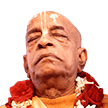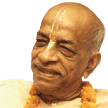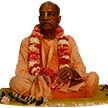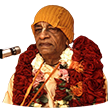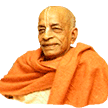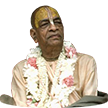Buddha - a glorious personality: Difference between revisions
(Created page with "Category:Glorious Personalities Category:Glorious Personalities from Bhagavad Gita Category:Glorious Personalities from Srimad Bhagavatam Category:Glorious Perso...") |
No edit summary |
||
| Line 10: | Line 10: | ||
{{Personalitiesnav}} | {{Personalitiesnav}} | ||
<!----------------- BEGIN STANDARD HEADING -----------------> | <!----------------- BEGIN STANDARD HEADING -----------------> | ||
Srila Prabhupada's books, lectures, conversations and letters reveal the qualities of this glorious personality as seen in the Vaniquotes '''[[Vaniquotes:Category: | Srila Prabhupada's books, lectures, conversations and letters reveal the qualities of this glorious personality as seen in the Vaniquotes '''[[Vaniquotes:Category:Buddha|Buddha]]''' category. An introduction from his books is given below in the following 8 quotes. | ||
<!----------------- END STANDARD HEADING -----------------> | <!----------------- END STANDARD HEADING -----------------> | ||
---- | ---- | ||
== Quotes from Srila Prabhupada's | == Quotes from Srila Prabhupada's books == | ||
<!----------------- edit quote boxes below this line -----------------> | <!----------------- edit quote boxes below this line -----------------> | ||
{{VaniQuotebox| | {{VaniQuotebox|According to the Buddhists' fifth principle, Lord Buddha is the only source for the attainment of knowledge. We cannot accept this, for Lord Buddha rejected the principles of Vedic knowledge|According to the Buddhists' fifth principle, Lord Buddha is the only source for the attainment of knowledge. We cannot accept this, for Lord Buddha rejected the principles of Vedic knowledge. One must accept a principle of standard knowledge because one cannot attain the Absolute Truth simply by intellectual speculation. '''(Caitanya-caritāmṛta, Madhya-līlā 9.49)'''}} | ||
{{VaniQuotebox| | {{VaniQuotebox|Anyone who does not accept the spiritual form of the Supreme Lord is counted among the atheists. Because Lord Buddha did not accept these Vedic principles, the Vedic teachers consider him an atheist|Anyone who does not accept the spiritual form of the Supreme Lord is counted among the atheists. Because Lord Buddha did not accept these Vedic principles, the Vedic teachers consider him an atheist. Although Māyāvādī philosophers pretend to accept the Vedic principles, because they do not accept the Supreme Personality of Godhead they indirectly preach Buddhist philosophy, or atheistic philosophy. '''(Teachings of Lord Caitanya, Chapter 25)'''}} | ||
{{VaniQuotebox| | {{VaniQuotebox|Atheists do not want any God, and Lord Buddha therefore said that there is no God, but he adopted the means to instruct his followers for their benefit|Atheists do not want any God, and Lord Buddha therefore said that there is no God, but he adopted the means to instruct his followers for their benefit. Therefore he preached in a duplicitous way, saying that there is no God. Nonetheless, he himself was an incarnation of God. '''(Śrīmad-Bhāgavatam 5.15.1)'''}} | ||
{{VaniQuotebox| | {{VaniQuotebox|Because he does not accept the authority of the Vedas, Lord Buddha is depicted as an agnostic or atheist|The word śruti jātam indicates that in the Vedas animal sacrifice is recommended, but Lord Buddha directly denied Vedic authority in order to stop animal sacrifice. Consequently Lord Buddha is not accepted by the followers of the Vedas. Because he does not accept the authority of the Vedas, Lord Buddha is depicted as an agnostic or atheist. '''(Śrīmad-Bhāgavatam 4.25.9)'''}} | ||
{{VaniQuotebox| | {{VaniQuotebox|Buddha preached nonviolence, taking pity on the poor animals. He preached that he did not believe in the tenets of the Vedas and stressed the adverse psychological effects incurred by animal-killing|Lord Buddha preached nonviolence, taking pity on the poor animals. He preached that he did not believe in the tenets of the Vedas and stressed the adverse psychological effects incurred by animal-killing. Less intelligent men of the age of Kali, who had no faith in God, followed his principle, and for the time being they were trained in moral discipline and nonviolence, the preliminary steps for proceeding further on the path of God realization. '''(Śrīmad-Bhāgavatam 1.3.24)'''}} | ||
{{VaniQuotebox| | {{VaniQuotebox|He (Lord Caitanya) considered the Sankarites, who wanted to establish Vedic authority by trickery and who actually followed the Mayavada philosophy of Buddha's school, to be more dangerous than the Buddhists themselves|Śrī Caitanya Mahāprabhu very clearly enunciated that the followers of Lord Buddha's philosophy are nāstikas, or atheists, because of their denial of the authority of the Vedas, He considered the Śaṅkarites, who wanted to establish Vedic authority by trickery and who actually followed the Māyāvāda philosophy of Buddha's school, to be more dangerous than the Buddhists themselves. '''(Śrīmad-Bhāgavatam 4.21.27)'''}} | ||
{{VaniQuotebox| | {{VaniQuotebox|In the Buddhist sastras Lord Buddha advises that one achieve nirvana by giving up the materialistic way of life. In the Bible, which is also sastra, one will find the same advice: one should cease materialistic life and return to the kingdom of God|In the Buddhist śāstras Lord Buddha advises that one achieve nirvāṇa by giving up the materialistic way of life. In the Bible, which is also śāstra, one will find the same advice: one should cease materialistic life and return to the kingdom of God. In any śāstra one may examine, especially the Vedic śāstra, the same advice is given: one should give up his materialistic life and return to his original, spiritual life. '''(Śrīmad-Bhāgavatam 6.5.20)'''}} | ||
{{VaniQuotebox| | {{VaniQuotebox|Lord Buddha appeared in the family of a high-grade ksatriya king, but his philosophy was not in accord with the Vedic conclusions and therefore was rejected|Lord Buddha appeared in the family of a high-grade kṣatriya king, but his philosophy was not in accord with the Vedic conclusions and therefore was rejected. Under the patronage of a Hindu king, Mahārāja Aśoka, the Buddhist religion was spread all over India and the adjoining countries. However, after the appearance of the great stalwart teacher Śaṅkarācārya, this Buddhism was driven out beyond the borders of India. '''(Nectar of Devotion, Chapter 7)'''}} | ||
<!----------------- edit quote boxes above this line -----------------> | <!----------------- edit quote boxes above this line -----------------> | ||
''' | '''Buddha - [[Vaniquotes:Category:Buddha|explore more within this category]]'''. | ||
{{GloriousPersonalitiesTotal}} | {{GloriousPersonalitiesTotal}} | ||
Latest revision as of 07:21, 11 February 2017
INTRODUCTION TEXT TO BE WRITTEN
Srila Prabhupada's books, lectures, conversations and letters reveal the qualities of this glorious personality as seen in the Vaniquotes Buddha category. An introduction from his books is given below in the following 8 quotes.
Quotes from Srila Prabhupada's books
Buddha - explore more within this category.
Vanipedia has now over 215 introductory articles compiled from Srila Prabhupada's teachings under the series titled Glorious Personalities. All these articles can be seen in the Table of Content on the right side of this article and also here in this Umbrella Category. Browse through them to relish the breadth and depth of Srila Prabhupada's teachings - There is an attractive personality for everyone.
